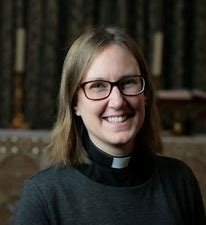
Sarah is a former student at St Augustine’s, and was ordained as a Lutheran minister in 2016. We asked her to tell us a bit about her experience as a Lutheran student at St Augustine’s, and how it helped to prepare her for her current role.

Why did you choose St Augustine’s?
I’m a life-long Lutheran; my father was a minister in the Lutheran Church in the US. There are no Lutheran seminaries here in the UK, so when my church here called me to discernment I could choose any college I liked.
I knew of other Lutherans who’d studied at St Augustine’s (or SEITE, as it then was), so I went to an open day. Right away it felt very inclusive and welcoming of different views as to how we live out our faith and different faith traditions.
Part-time study also sounded really appealing. At the time I was an Assistant Director for academic affairs, so being able to combine study with my full-time job was ideal.
One of the things that really impressed me is the college’s ability to tailor programmes and courses of study to different student needs. With my own background in academia, I am in awe of how they are able to put the student first and do the best they can for each individual. That’s rare, I can tell you.
What was studying at St Augustine’s like?
I’m so glad I went there. It was a wonderful experience, and I met people from many other church backgrounds whom I wouldn’t otherwise have encountered.
I was the only Lutheran and only non-Anglican student there. At times that was tough – when you’re the only one you’re asked to speak for your entire tradition – but it was also really positive because it reaffirmed why I am a Lutheran, and I understand my own faith tradition better now.
St Augustine’s encourages everyone to explore different worship styles, so I had to get out of my own comfort zone and explore, which is really good. It all meant that when I went out and had my own experiences as an ordained minister I also had some variety in my background.
When I finished my training I decided to stay on and do a Masters. I think I was the first to do the new Masters programme. I chose to do it full-time in two years instead of three, which was a challenge, but Guido, the Director of Studies, was very supportive, and it’s a wonderful environment in which to do a masters.
I was ordained during my masters study. Unlike in the Anglican church, in the Lutheran church we don’t do curacies. You’re ordained and that’s it. I started out as an assistant minister, but in 2017 I moved into student chaplaincy.
How St Augustine’s prepared me for my role after ordination
I was at one point considering a senior minister role, but decided chaplaincy was where I wanted to be. Having worked for over 12 years in Higher Education I knew I loved working with students and wanted to continue that. It’s such an exciting time in their lives, figuring out who they are and who they want to be.
So I’m now chaplain for students in the International Lutheran Student Centre (based in London and responsible for students living there as well as Lutheran students across the country), Lutheran chaplain to King’s College, London and College Chaplain to Mansfield College, University of Oxford.
I find it really helpful being involved in these different communities, as each one opens my eyes and ears to what different students are facing.
The exposure I had to different traditions at St Augustine’s has been hugely helpful, as it gave me a sort of ‘library’ of ways to express faith, which is really valuable as a chaplain. Though a Lutheran chaplain, I meet and support students of all faiths and philosophies (in fact, I rarely meet a Lutheran!), so I need to be creative in terms of how faith is expressed.
I do feel very lucky to be part of the Lutheran church, though, as it’s usually known to be very outward looking and progressive. We are there to serve our neighbours, and don’t have to worry so much about what Church hierarchy expects of us. So I can feel supported in marching for things like LGBT rights and #BlackLivesMatter, as the Lutheran tradition itself rests on the need to challenge oneself and others and to call out the need for change and reform.
For information on studying at St Augustine’s see here.


